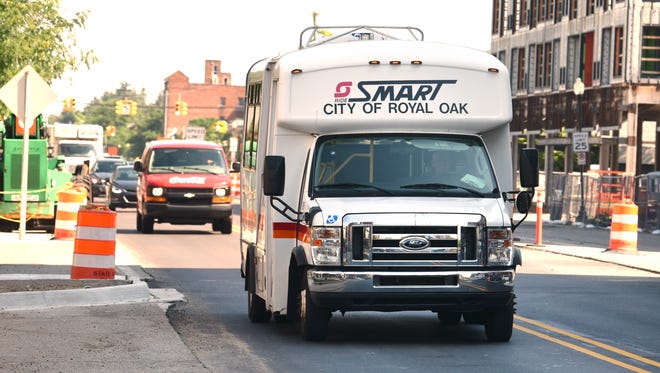Royal Oak might get its own citywide bus service

Royal Oak might offer a citywide bus service if proposal language, recently approved by city commissioners, reaches the Nov. 6 ballot.
The city's proposal, ROGO — which stands for Royal Oak Go — would expand on its SMART bus service by adding stops and increasing service frequency.
The proposal includes two new fixed routes along Crooks and Coolidge to the downtown as well as along 13 Mile, Campbell and 11 Mile to the downtown. There also will be one expanded SMART route from Big Beaver to Woodward.
“They’re taking what SMART has and enhancing it to meet the needs of our community,” Mayor Michael Fournier said. “SMART has gaps, and we would be filling them in to increase mobility for residents, workers and visitors.”
He added that “Beaumont and the Detroit Zoo are excited about it as well.”
Whether it appears on the ballot depends on if the Regional Transportation Authority of Southeast Michigan decides to move forward with a revamped proposal for regional mass transit, which is called the Connect Southeast Michigan plan.
RTA COO Matt Webb said the authority will take it up for a preliminary vote at its next board meeting on July 19.
“We’ll then take a follow-up vote a week later during a special meeting to put it on the November ballot, if it passes during the July 19th meeting,” he said.
Webb said what Royal Oak is attempting to accomplish is what already would be possible through the Connect Southeast Michigan plan.
“Communities can design transit that meets the needs of their citizens,” he said. “But the types of services they’re proposing would be eligible under the Connect Southeast Michigan.”
If the RTA votes to place its plan on the November ballot then the Royal Oak citywide bus proposal would not proceed, Fournier said.
The plan before the RTA is not without controversy. It has been publicly ridiculed by the executives of Oakland and Macomb counties.
But Oakland County Executive L. Brooks Patterson backs Royal Oak's initiative.
“County Executive Patterson supports any community that wants to improve transit services within its own borders," said Patterson spokesman Bill Mullan in an email.
"There are a number of ways under state law for communities to enhance transit options through SMART, including the route Royal Oak is taking. This works because the transit services received are commensurate with the taxes paid.”
But Mullan said Patterson remains staunchly against the proposal under the RTA's consideration.
“Oakland County will not support placing an RTA tax on the ballot at any time without an amendment to the RTA legislation in Lansing," he said.
"That amendment must include both a change in the governance structure of the RTA board and a reduced taxing footprint encompassing communities that have traditionally supported SMART through the Act 196 authority and voted in favor of the RTA in 2016.”
The Connect Southeast Michigan plan is a 20-year, $5.4 billion proposal that calls for new rapid transit bus service along 15 high-frequency corridors, express routes and the Ann Arbor-Detroit commuter rail line. It would also provide “hometown service” funding for communities like Addison or Independence Township that won’t be covered by the new bus routes.
The tax would cost owners of the average house worth $157,504 in the region $118 a year. The Royal Oak proposal would cost the same house roughly $98 a year.
"I would vote for it without question," said Royal Oak resident Mike Ripinski, 67, who drives but occasionally takes SMART. "Let the people of Royal Oak decide if the majority wants it."
The Royal Oak City Commission appointed a transit task force in November, and Marie Donigan is its chairwoman.
Donigan said the city plan includes 25 bus shelters and up to 168 bus stops with signs
There also will be 14 onboard cameras, 14 fare boxes, a bus-tracking system and app. The frequency of bus arrivals would be between 15 and 30 minutes during peak times.
“We came up with a funding plan where we could arrange state and federal funds to operate it at 30 percent, and SMART would use their purchasing power to buy the buses with no cost to the city, and we would purchase the bus shelters. We would contract with SMART to operate the system,” Donigan said.
But not everyone is celebrating the possibility of a citywide bus service in Royal Oak.
City Commissioner Kim Gibbs voted against taking the service proposal before voters.
“There are too many unanswered questions," she said in an email. "ROGO will be used, as I understand it, in line with our current senior transport through our senior center system. SMART funds a portion of our senior transport. Will the senior center lose its funding? The ROGO Plan does not include door-to-door.
"As planned, ROGO stops are greater than one-quarter mile from all of the western part of the city, but for Beaumont. "
Gibbs said she believes it will require upward of 2 mills, not the 1.25 mills as part of the proposal.
City Commissioner Randy LeVasseur said he also voted against the proposal.
“I found it to be expensive and lacking in ingenuity,” he said in an email. “Rather than partner with or build upon the curb-to-curb models of Uber and Lyft, this proposal recommends the tired old transit model of mostly empty buses going around in circles on fixed routes. I don't believe that model serves transit riders or taxpayers well.”
On the other side, Mayor Pro Tem Sharlan Douglas said she is “enthusiastically in favor” of the proposal.
“People who don't want to deal with parking in our downtown can take the bus,” she said. “Our system will connect seamlessly with SMART's, so our residents can connect with the rest of the region.”